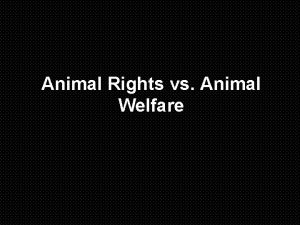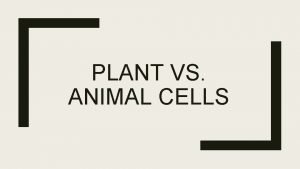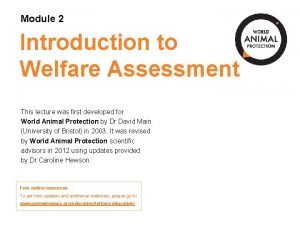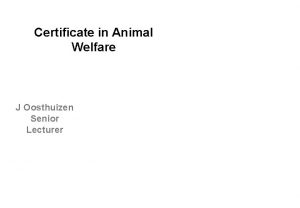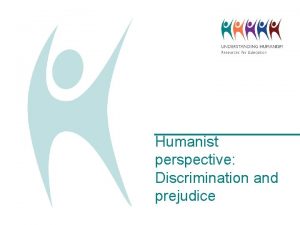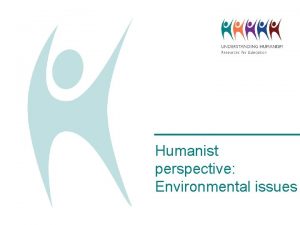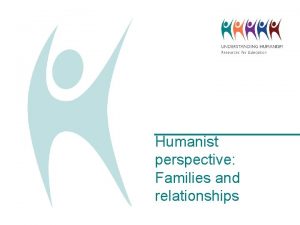Humanist perspective Animal welfare Humanist perspective There is









- Slides: 9

Humanist perspective: Animal welfare

Humanist perspective There is no universally agreed humanist perspective on animal welfare. Humanists try to use reason, evidence, empathy, and respect for others when thinking about ethical questions. They have to think for themselves, and decide whether, and how far, to extend their concern for the welfare of human beings to other animals. A rational morality, based on evidence, experience, and empathy, is likely to include an unwillingness to cause animals unnecessary suffering.

The question is not, Can they reason? nor Can they talk? but Can they suffer? Evidence of suffering The question is not, Can they reason? Nor Can they talk? But Can they suffer? All the arguments to prove man's superiority cannot shatter this hard fact: in suffering the animals are our equals. Jeremy Bentham, philosopher (1748 – 1832) Peter Singer, humanist philosopher Scientific research and evidence shows animals’ brains, nervous systems, and behavioural responses are quite like ours. Empathy and compassion are key components of ethical decision making for many humanists and so evidence of animal suffering will play a strong role in their decisions about how we should treat animals.

Animal welfare Animals are not here for us to do as we please with. We are not their superiors, we are their equals. We are their family. Be kind to them. Ricky Gervais, comedian, animal rights campaigner, and patron of the British Humanist Association

The question is not, Can they reason? nor Can they talk? but Can they suffer? Reasoning and extending our moral circle To give preference to the life of a being simply because that being is a member of our species would put us in the same position as racists who give preference to those who are members of their race. Peter Singer, humanist philosopher ‘Speciesism’: privileging humans over other animals Peter Singer is a utilitarian and believes ethical decisions should be based on achieving ‘the greatest good for the greatest number’, and that we should include animals in that calculation. Not all humanists agree, but many sympathise with the idea that we should take non-human animals into account when making ethical decisions. If we can extend our moral circle beyond our immediate family, to our community, and then out to the rest of the human race, then we should be able to extend it out to other animals: our extended family. If possessing a higher degree of intelligence does not entitle one human to use another for his or her own ends, how can it entitle humans to exploit non-humans? Peter Singer

Vegetarianism Humanists do not all agree on whether it is morally acceptable or not to eat meat. Many will, however, disapprove of the way we treat many of the animals we breed for food. Many humanists think that some traditional religious ritual slaughter (where animals are bled to death without pre-stunning and therefore suffer unnecessarily) should not be allowed. We should consider the evidence for the harmful environmental effect of farming animals on our planet. There also consequences of farming meat on human poverty and inequality. Animals use land food that could be used to grow vegetable crops that could feed many more people much more directly and economically. By ceasing to rear and kill animals for food, we can make so much extra food available for humans that, properly distributed, it would eliminate starvation and malnutrition from this planet. Animal Liberation is Human Liberation too. Peter Singer, humanist philosopher

Questions for discussion 1) 2) 3) 4) 5) 6) 7) 8) 9) 10) 11) 12) 13) 14) 15) 16) 17) 18) Should there be such a thing as animal rights? What rights should animals have? Can we have rights without duties? Does the fact animals do not respect our rights mean we should not respect theirs? Should empathy be extended to non-humans? How far should our moral circle extend? Is there anything that makes us different from all other animals or is it all a matter of scale? Do some animals matter more than others? Should there be some kind of sliding scale of concern? New-born babies could be said to be less sentient, less aware of themselves and others and the past and the future, than adult chimpanzees. Does that mean we should experiment on new-born babies rather than adult chimpanzees? Is the life or pain of a human being worth more than the life or pain of a rabbit? Two rabbits? Fifty rabbits? A thousand rabbits? How many elephants? A rabbit is born and lives its whole life in a small barren cage. Does it make any difference to your moral views on this if it is kept (a) as a pet, (b) for meat, (c) for fur, (d) for medical experiments, (e) for beauty product experiments. Do you think that animals have a different attitude to death from humans? Given the consequences on the environment of land use, is eating ‘free range meat’ morally better than eating battery farmed meat? Some ritually slaughtered meat is sold in butchers, supermarkets, and restaurants without being labelled. Do you think it should be sold or served at all? Or just to the religious groups that require it? Do you think it should be clearly labelled? Would you buy or eat it? Should we only be allowed to test things on creatures capable of consenting to such testing? What new issues of animal welfare (if any) does genetic modification raise? Is it right to genetically modify animals for organ donation to humans? Would there be anything wrong in, say, genetically modifying pigs so that they liked being kept in battery pens? How consistent are you in your attitudes to animals? How are you deciding your answers to these questions? What principles and arguments influence your answers? How is the humanist view on this issue similar or different to that of other worldviews you have come across?

Different ways humans use animals Humanists try to make use of reason and evidence when considering questions about how human beings use animals, but this will sometimes lead different humanists to different conclusions, often depending on specific circumstances or situations. 1) Order the different ways we use animals according to which is most or least acceptable? 2) Can you think of circumstances and situations which would make each use more or less acceptable? • Pets • Travel • Work • Food • Wool • Leather • Fur • Sport • Hunting • Zoos • Circuses • Cosmetics experiments • Medical experiments • Genetic modification

understandinghumanism. org. uk Understanding Humanism 39 Moreland Street London EC 1 V 8 BB British Humanist Association (registered charity 285987) © 2015
